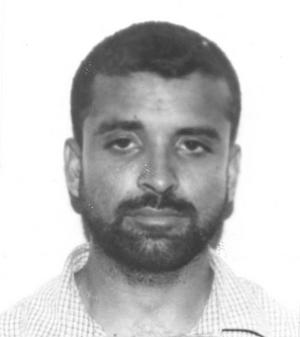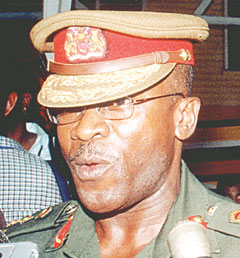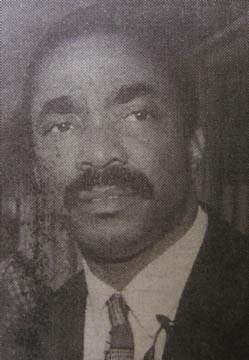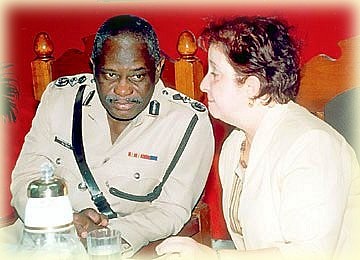Shaheed
"Roger" Khan.
see
link to Roger Khan: The Obstacle to a Black Militant Campaign
in Guyana Embattled businessman Roger Khan yesterday said
that a US Grand Jury indictment of him on a drug charge was motivated
by political considerations and he again said he worked closely
with the police force in combating the 2002 crime spree, helping
in the bid to free a kidnapped American diplomat. PNCR spokesperson on crime, Debra Backer last
evening told Stabroek News that she had not seen the statement
but she presumed that it would be dealt with at the party's press
conference today. She, however, said that the party had no intention
of allowing Khan to distract it from its programme of work. The US District Court Eastern District of New York unsealed a grand jury indictment on May 3 which charges that Khan conspired to import drugs into the US between January 2001 and March 2006. The indictment was issued on April 13 by a grand jury numbering 19 in a court in Brooklyn, New York. Local authorities are still awaiting a formal request from the US for Khan's extradition which is likely to happen shortly. According to the brief statement by the US, "Mr. Khan is welcome to apply for a U.S. visa through our normal procedures in order to travel to the U.S. so that he can be processed through the U.S. judicial system." Among other things, Khan through his lawyers:
Vic Puran and Glenn Hanoman denied that he conspired to import
cocaine into the US. His lawyers are also calling on the US to
present its witnesses to be cross-examined at any local extradition
proceedings so as to test the basis of the evidence brought against
Khan. Meanwhile, in a two-page statement released by one of Khan's
lawyers yesterday, the fugitive said that the grand jury indictment
and anything flowing from it, including a request for his extradition
have been motivated by political considerations.
Left: the Chief of Staff, Brig. Edwards Collins. Khan charged in his statement that, when American diplomat, Steve Lesniak was kidnapped from the Lusignan golf course and taken to the village of Buxton during the height of the crime wave in 2003, he (Khan) met with operatives from the American Embassy on a daily basis and provided them with information and hard evidence that led to the issuance of an arrest warrant for escapee Shawn Browne. Browne was accused of masterminding the kidnapping. Lesniak was subsequently freed after a ransom was paid but this was said to be a turning point in the crime fight as several of the escapees and other known bandits were mysteriously killed after this. Khan said that he met with American operatives
including the Deputy US Ambassador and the US regional security
officer of the Caribbean in March this year at the Ocean View
International Hotel, Liliendaal. At that meeting which lasted
for over three hours, Khan said he provided the US officials with
evidence that sections of the security forces in Guyana had strong
political motives for encouraging and protecting the so-called
armed resistance of Buxton. Meyer denied that there was ever such
meeting with Khan and the officials. She said as far as she knew
it was a fabrication on Khan's part. Khan alleged that the US has been acting in
collusion with leaders of the police, army and the PNCR. The businessman
also attacked US policies, saying that one of the world's richest
nations aided and abetted a criminal rebellion in Haiti to remove
a democratically elected government. Khan said that Latin America
is moving away from US hegemony and now socialist governments
are in place in Venezuela, Brazil, Bolivia, Chile, Cuba and Guyana.
He said that Guyana has once again assumed geopolitical importance
and as such it is crucial for American interests to install a
puppet regime here. According to the indictment, the Grand Jury
charged that between January 2001 and March 2006 within the Eastern
District of New York and elsewhere, Khan together with others,
knowingly and intentionally conspired to import a controlled substance
containing cocaine. [Editor's Note: This article was sent to and published in Stabroek News under the title, "Drug charge motivated by politics."] |
| May 11, 2006 |
©
2001 Guyanaundersiege.com |



